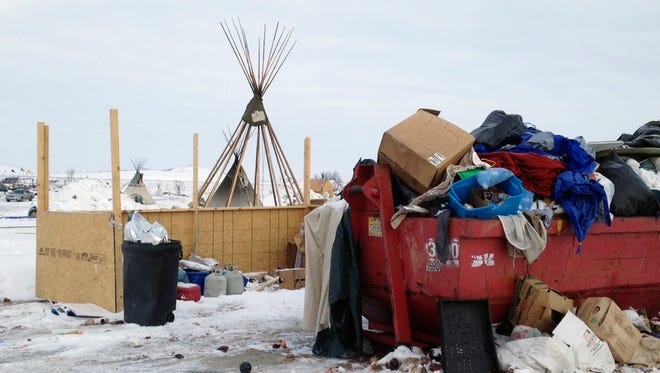Judge denies request to halt Dakota Access pipeline work

WASHINGTON — A federal judge declined Monday to halt construction on the final disputed section of the Dakota Access Pipeline, despite the vocal objection of Native American tribes who claim the project threatens an important Indian country water source.
U.S. District Judge James Boasberg's decision not to grant a temporary restraining order means that work may proceed toward the completion of the 1,172-mile system that will run from North Dakota to Illinois. Boasberg set a Feb. 27 hearing on a further request from the Standing Rock Sioux and the Cheyenne River Sioux tribes to block the work, which has been shadowed by heated protests for months.
"Of course, we are very disappointed,'' said Harold Frazier, Cheyenne River Sioux chairman. "Our water is our life, but we know the (Trump) administration is in favor of this.''
Among his first actions in the White House, President Trump directed the U.S. Army Corps of Engineers to move forward with the $3.8 billion project. Last week, the corps provided developer Energy Transfer Partners with the critical easement needed for the underground crossing the Lake Oahe reservoir on the Missouri River in North Dakota, at the Standing Rock reservation.
Attorneys for Energy Transfer Partners had told Boasberg in December that suspension of the project because of legal challenges was costing $20 million per week.
The packed Monday hearing included representatives from both tribes, including one woman wrapped in a tattered American flag.
"The judge has no authority to do this,'' Joann Spotted Bear, 46, called out in the hallway just outside of Boasberg's sixth-floor courtroom. "They are getting away with murder.''
C.J. Clifford, 55, of Pine Ridge, S.D., who had traveled to Washington to support the tribes' challenge, called on the judge to recuse himself from further hearings, alleging that Boasberg had demonstrated "little knowledge of Native American issues.''
Nicole Ducheneaux, an attorney representing the Cheyenne River Sioux, described the potential threat to the water supply as "dire,'' suggesting that the oil pipeline — should it be breached — could foul the important water source.
"The threat is irreparable,'' she said outside the courthouse.
Despite the ruling, Frazier said the tribes would push forward with their request for an injunction.
"We'll just have to re-group and try harder,'' Frazier said. "We just go to keep fighting.''

The tribes added a religious freedom component to their case last week by arguing that clean water is necessary to practice the Sioux religion and that the mere presence of the pipeline renders the water impure.
At the hearing, though, Boasberg said the harm to the tribe apparently would come from the pipeline being turned on and the oil flowing through it, not from the pipeline’s mere presence.
The company’s attorneys filed court documents early Monday urging Boasberg to reject the tribes’ request, calling the new religious freedom argument “exceedingly tardy,” “not construction-related” and a “last-minute delay tactic.”
How the Dakota Access pipeline battle unfolded
Dakota Access, Keystone XL: 2 pipelines, 2 flash points
We’ll keep fighting these dirty projects: Opposing view
Dakota Access, Keystone XL oil pipelines: A look at what's next
“Dakota Access has the greatest respect for the religious beliefs and traditions of (tribes). The emergency relief sought here simply is not necessary to protect the exercise of those beliefs or preserve those traditions,” wrote William Scherman, an attorney for the company.
The Corps also filed court documents Monday arguing that a work stoppage isn’t warranted, saying the tribes will have plenty of time to make their case before oil flows through the pipeline.
The drilling work is expected to take about two months. The full pipeline system could be operational within three months.
Energy Transfer Partners maintains that the pipeline is safe and disputes that cultural sites have been affected. But an encampment near the construction in southern North Dakota drew thousands of protesters last year in support of the tribes, leading to occasional clashes with law enforcement and nearly 700 arrests. The camp has thinned to fewer than 300 people, but law enforcement officers continue to maintain a presence in the area.
———
Contributing: Associated Press